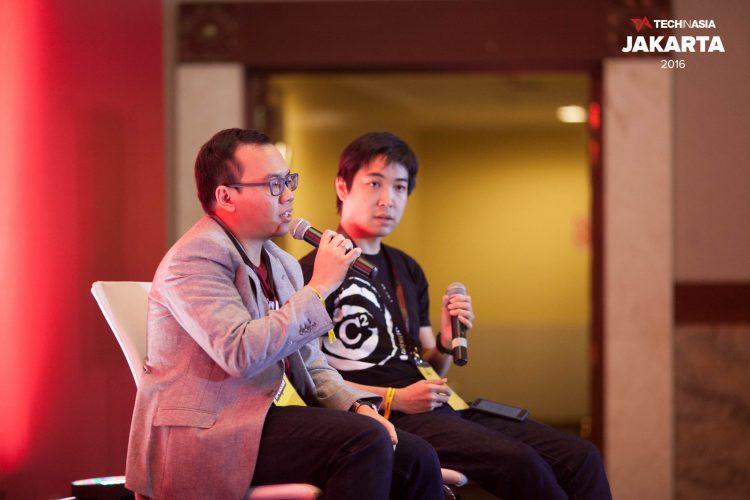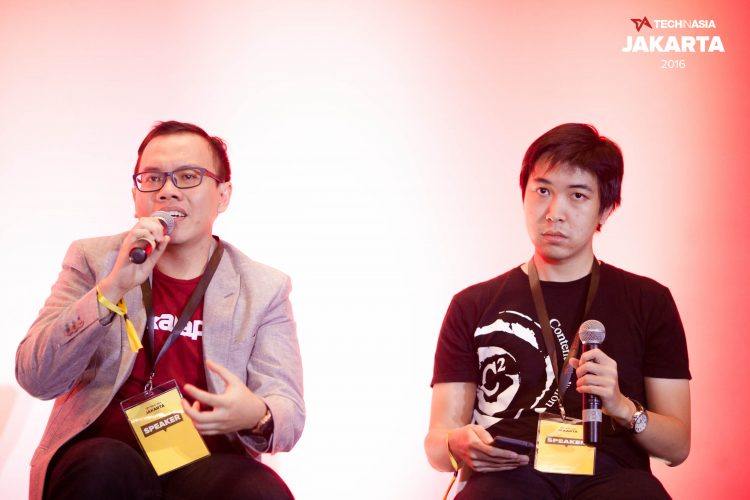
Photo credit: nicoletaionescu / 123RF Stock Photo.
Each time I move to a different area in Asia, I love trying out different service apps. I get a friend to send me her account code so I get a referral discount, and my weeklong sizzling affair begins. I reap new customer benefits – half off my first order, 25 percent off my second order, and maybe 10 percent cashback on another five purchases – which I’d spend in one blaze of glory.
My app-given perks completely consumed, I delete the company from my smartphone and my life, fall into the arms of one of its attractive competitors, and start the process again. No one can tie me down while I live in commitment-phobic discount bliss.
According to Bukalapak CFO Fajrin Rasyid, startups that can’t keep customers from cheating are playing with deadly fire. Companies need to be strong enough to withstand such disloyal customers – or it’s over.
Defining your awesome

(From left) Fajrin Rasyid and Enricko Lukman advise a full house.
It’s standing room only at the Startup 101 stage at Tech in Asia Jakarta 2016 – and by standing room only, I mean people are spilling out of the session through cracks in the curtains into the hallway behind. I try to slide in to watch Content Collision COO Enricko Lukman pick Fajrin’s brain about which is more important in a startup strategy – growth or profitability. On my third attempt, I barely manage a seat on the fringes.
It’s not about choosing between growth or profitability, Fajrin tells the audience. “You can’t think about one first and then the other.” In a company’s earliest days, the road to achieving and tracking goals can be as easy as comparing how many downloads or customers you can convert into sales, he says.
Companies need to be strong enough to withstand such disloyal customers, or it’s over.
“The product must be awesome,” he stresses. The difference between scaling a company and making a profit off the bat lies in your definition of awesome.
“If 80 percent of your friends are on Facebook, and you’re the remaining 20 percent, you’re likely [going to end up using] Facebook as well,” he explains. It’s all about catalyzing the fear of missing out (FOMO) in others. In contrast, the same appeal wouldn’t exist for a reading app if a person didn’t like to read.
If your idea of awesome hinges on a social popularity factor (or if you’re working in an industry with plenty of competition), then focusing on growth might be your best bet.
See: Emtek financial report has clues on Bukalapak valuation
Reality check

If you’re not feeling the viral life, Fajrin suggests the current cautious investor climate might be reason enough to prioritize profitability over scale.
He says Bukalapak ran into problems when pitching for funds because as far as investors were concerned, there were few big Indonesian startup successes to point to. Since Bukalapak has a similar concept to other US ecommerce giants like Amazon and Ebay, he pointed to those in meetings as indications of success down the line, but that’s not always good enough.
“Investors used to just ask for our growth for six to 12 months,” he shares. Now, they ask for information about subsidies that lure in discount hunters, and how a company’s progress looks when those are taken away.
The product must be awesome.
Solid startups can stay afloat without discounts, while ones on shaky ground could be the next Homejoy, an on-demand services startup that shut down last year amid lawsuits and problems with revenue growth.
“In developing countries like Indonesia or India, the situation is different [than in the US]. We don’t have money, but we have a lot of time,” he says. Even if an ecommerce company is in sixth place nationally, it’ll take customers away from the first or second if it holds a promotion.
The price of good and bad customers
When it comes to customer acquisition, he advises making sure the overall long-term value of your product outweighs how much you’re spending to get people to check out your product.
And don’t forget to keep an eye on your rivals. “If there’s not much differentiation [in your startup] compared to competitors, and your competitors are aggressive in scale, that’s dangerous,” he says.
Bukalapak, which has been around for five years, follows the profit track, claims Fajrin, though the company has yet to make a profit.
This is part of the coverage of Tech in Asia Jakarta 2016, our conference that took place on November 16 and 17.
This post Customers’ cheatin’ hearts will make you weep: Bukalapak COO appeared first on Tech in Asia.
from Tech in Asia https://www.techinasia.com/bukalapak-fajrin-rasyid-tiajakarta2016-scale-profit
via IFTTT
No comments:
Post a Comment